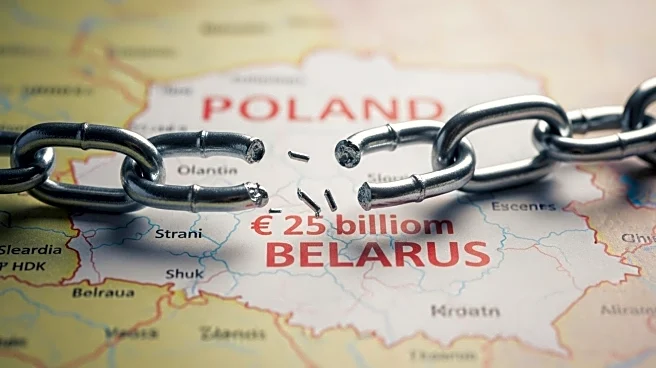What's Happening?
Poland has closed its border with Belarus, disrupting a major export route for Chinese goods to the European Union. This decision was made in anticipation of joint Russian-Belarusian military exercises, known as Zapad 2025. The closure affects three freight rail crossings and is expected to significantly impact Chinese imports to the EU, as 90% of rail freight between China and the bloc passes through Poland. Beijing is urging Warsaw to reopen the border to restore the €25 billion freight link. High-level talks are scheduled between Chinese Foreign Minister Wang Yi and Polish counterpart Radosław Sikorski to address the geopolitical tensions and discuss reopening the rail link.
Why It's Important?
The closure of the Polish-Belarusian border has significant implications for international trade and geopolitical relations. The disruption of the China-Europe Railway Express affects both Chinese e-commerce platforms and Polish companies reliant on this route. The situation highlights the vulnerability of global supply chains to geopolitical events. Additionally, the closure comes amid heightened tensions between Russia and NATO, with President Trump urging EU countries to impose trade tariffs on China to pressure Beijing to stop buying Russian oil. This move is part of broader efforts to influence China's stance on the ongoing conflict in Ukraine.
What's Next?
The upcoming meeting between Chinese and Polish officials will be crucial in determining the future of the rail link. Both countries are expected to discuss bilateral relations, China-EU relations, and international issues of common interest. The outcome of these talks could lead to a reopening of the border, restoring the disrupted trade route. Meanwhile, businesses affected by the closure are adapting to the circumstances, with some shipments potentially being rerouted by sea or air, impacting costs and operational quality.
Beyond the Headlines
The border closure underscores the complex interplay between trade and geopolitics. It raises questions about the stability of international supply chains and the influence of military activities on economic relations. The situation also highlights the strategic importance of Poland as a transit hub for Chinese goods entering the EU, and the potential leverage this gives Poland in negotiations with China.










